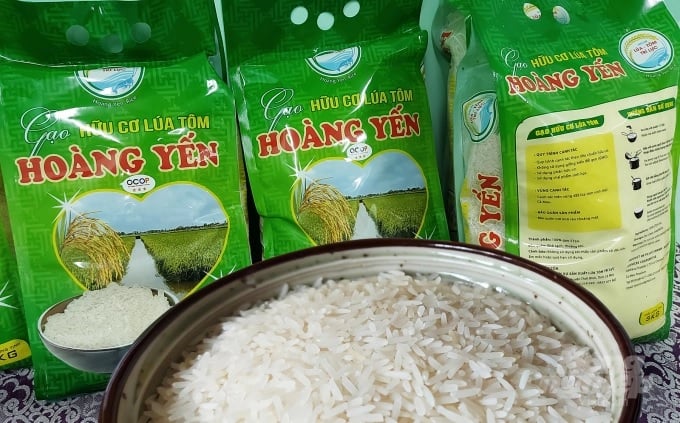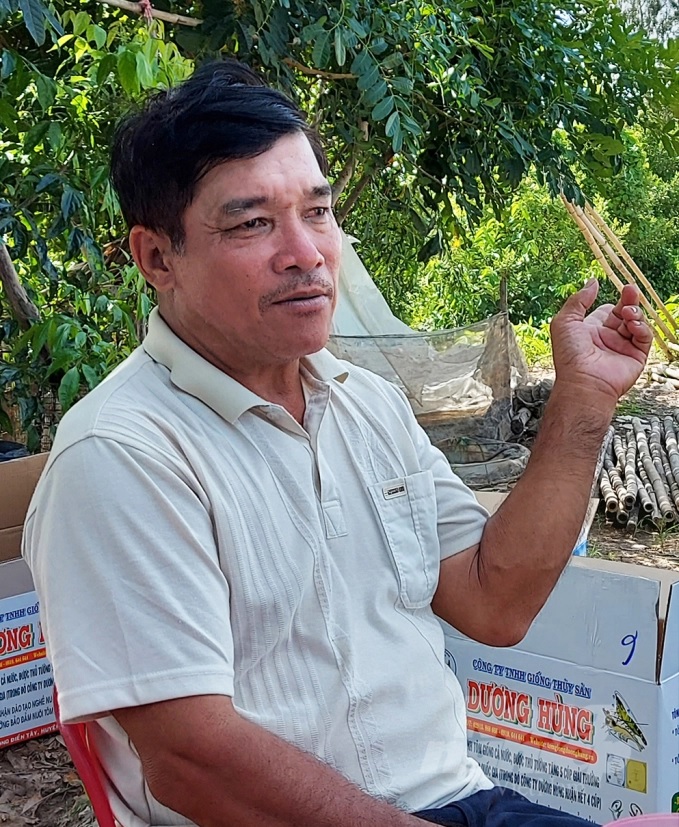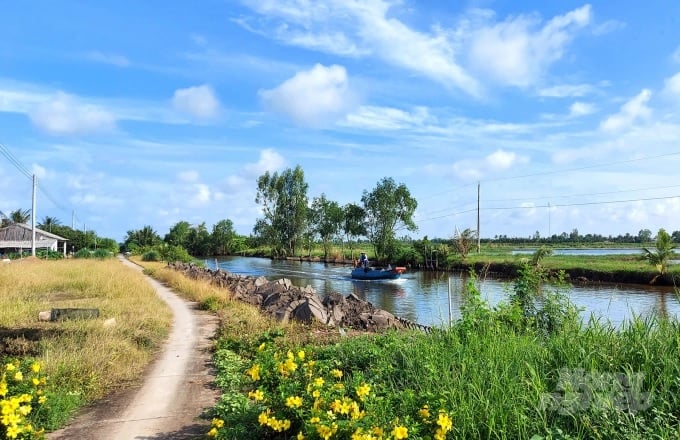May 19, 2025 | 04:40 GMT +7
May 19, 2025 | 04:40 GMT +7
Hotline: 0913.378.918
May 19, 2025 | 04:40 GMT +7
Hotline: 0913.378.918

Hoang Yen organic rice - a product of the organic shrimp-rice model. Photo: Do Khue.
According to Mr. Le Tran Thien Nhan, production director of Tan Vuong Food Co., Ltd. (Tan Vuong Co.)- a company that has met the High Quality Vietnamese Goods - Integration Standard since 2017, Tan Vuong Co. is cooperating with Thanh Cong Cooperative and Tri Luc Cooperative in Thoi Binh district to plant ST24, ST25 rice varieties following organic standards.
In 2010, this area abandoned seasonal rice to plant short-term rice. When it was time to harvest, they had to earnestly pray to the God of Wealth and the God of Earth. But now, the situation has changed. “By the time we apply the standards, as soon as the seeds are sown, there is already someone who come to offer purchase,” said Mrs. Le Thi Diep, 67 years old, an elder in Tri Luc commune.
When it was still a cooperative group in 2013, Tan Vuong Food Co, had already come to this place. But at that time, traders also caught sight of the good rice, put higher stakes, then bought them all. In the following year, the company did not come to buy, the traders disappeared as well. Everyone in Tri Luc commune knew about this story.
“In 2018, Tri Luc Cooperative was established with only 15 members, farming in 50 ha of land. Tan Vuong Co. returned to provide technical guidance, seeds, and underwrote products at a negotiable price. From the success of these 15 members, after only a year, the cooperative has accumulated 200 ha of cultivation land. The shrimp-rice area and the safe rice growing area have exceeded 1,000 ha, with 500 households working together to grow organic rice," said Mr. Le Van Mua, Director of Tri Luc cooperative.

Mr. Le Van Mua, Director of Tri Luc cooperative. Photo: Do Khue.
Due to the characteristics of Thoi Binh land, Tri Luc Cooperative produces two shrimp crops and one rice crop. Shrimp farming normally starts at the end of August and is harvested near the Tet holiday. Depending on the weather, sometimes the cooperative raises black tiger prawns, sometimes it raises giant freshwater shrimps, and sometimes it intercrops between shrimp and rice.
In the past, when it was time for sowing, Tan Vuong's technicians were present 24/24 in Tri Luc commune. Now, without the company's help, farmers can still do the work properly.
In addition to distributing some portions to sell to the company, Tri Luc cooperative saves some rice to eat and packs it to sell outside while using the brand name ”Hoang Yen organic rice”. The price is from VND 24,000 to 30,000/kg. During the Tet period, rice sales can be up to 200-300 kg/month.
“Hoang Yen is not a rice variety but instead the name of the rows of the golden shower trees blooming brightly on the village road. In the past, the Adaptation to climate change in the Mekong Delta (AMD) program helped people here adapt to climate change and improve their livelihoods. The program organizers gave us these trees as a gift. Hoang Yen is the cooperative's own brand to express gratitude to AMD for their help," said Ms. Le Thi Diep, a member of Tri Luc Cooperative.
From this season, organic rice companies have agreed on a fixed purchase price of VND 9,000 - 9,500/kg. After deducting costs, the average profit of a standard rice grower is approximately VND 100 million/ha/year.
“The biggest benefit of organic rice farming is that there is a certainty in every shrimp crop,” said Ms. Truong Thi Kieu Diem, Deputy Director of Tri Luc Cooperative.
The cooperative uses 35 ha of land to implement the model ‘Responsible rice-shrimp farming adaptive to climate change" - a project supported by the Dutch Fund for Climate and Development (DFCD) and directed by the World Wildlife Fund (WWF) Vietnam, helping farmers access green finance sources, increase profits in shrimp-rice production, and gain the companionship of enterprises.

The path to the shrimp-rice area. Photo: Do Khue.
Mrs. Le Thi Diep recalls the journeys of turning this reed land into a land worth living. The people used to build embankments to grow bananas, pineapples, sugarcane, and rice. They couldn’t count the times when every house had just enough to eat, and having no debt was already a blessing. By 2007, whatever crops or cattle were raised, they hesitated to harvest in fear of traders not buying or buying the products dirt cheap. “But now people here eat one of the best rice in the world. Even the chickens here eat organic broken rice. All are freed from their misery.”
Translated by Samuel Pham

(VAN) 14 out of 35 domesticated elephants in Dak Lak province have had their living conditions improved, with 11 of them currently participating in the non-riding elephant tourism model.

(VAN) Muong Nhe Nature Reserve hopes that being upgraded to a national park will lay the foundation for forest protection efforts to be carried out in a systematic, modern, and sustainable manner.
/2025/05/16/3923-2-171845_52.jpg)
(VAN) Lower costs, higher yields, and improved soil quality are outstanding benefits that soybeans bring when integrated into the crop rotation system.

(VAN) The 'For a Green National Environment' programme aims to promote a green lifestyle, support businesses in implementing ESG practices, and turn Net Zero commitments into concrete actions.

(VAN) Cold-barn systems efficiently manage environmental and temperature conditions, which aids in the prevention of respiratory diseases in pigs and protects them from the vectors that transmit African swine fevers.

(VAN) To tackle challenges, the project 'Addressing key technical bottlenecks in the grouper supply chain in Vietnam' has been underway since 2024.

(VAN) The project 'Disease-Resilient and Sustainable Cassava Production Systems in the Mekong Region', funded by the Australian Center for International Agricultural Research (ACIAR), is being implemented from 2024 to 2028.